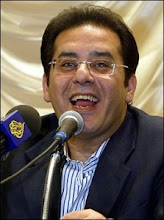Ahmed Aboul Gheit, the Egyptian Minister of Foreign Affairs, committed a fallacy while commenting on the Public Prosecutor’s decision to prevent me from traveling to the U.S. last week. He stated that “the prosecutor’s decision has nothing to do with the Egyptian government!” Apparently, Aboul Gheit does not know that the Public Prosecutor of Egypt is affiliated with the Egyptian government, not another country. The Public Prosecutor’s office is an essential part of the executive authority headed by President Mubarak, who assigns the public prosecutor via a presidential decree.
Aboul Gheit’s statements from Sharm El-Sheikh encouraged opening a thorny file to answer the critical questions: Does the Egyptian public prosecutor truly represent the social structure including its sectors, parties and various forces? Is the public prosecutor, merely, a crown of the executive authority with its one political color and one party? Is the public prosecutor biased in fulfilling the direct and indirect demands of the head of the executive authority on the expense of the social structure, which the public prosecutor represents?
First of all, let’s examine the mechanism of selecting the Public Prosecutor in Egypt. Despite his unlimited powers, the public prosecutor is not selected or nominated by the General Assembly of the Cassation Court. In other countries across the world, the public prosecutor is hired by the Cassation Court and is usually given a judicial role. In Egypt, it is quite different. In Egypt, article 119 of Law 142/2006 stipulates the necessity of the approval of the Supreme Council of Judiciary on the selection of the Public Prosecutor, Assistant Public Prosecutor, Attorney General, and other members of the Public Prosecution. However, the President of the state – who is also the head of the executive authority – selects the Public Prosecutor with a presidential decree, with complete disregard to the aforementioned approval of Supreme Council of Judiciary.
This statuesque emphasizes the absolute power of the head of the executive committee to hire whoever he wants in this very critical position. Subsequently, neutrality and independence is absent. There is controversy around some cases in the Mubarak era. The most prominent is hiring Councilor Ragae’i El-Arabi, in 1991, as a Public Prosecutor, on the backdrop of his work in the “politically motivated” State Security Prosecution. He was selected for the vital position despite the long line of worthy older names. Another controversial case was that of Maher Abdul Wahed, who did not serve at the Cassation Court or at least as an Assistant Prosecutor or an Attorney General! In one day, he moved from an administrative job at the executive authority, as Assistant Minister of Justice to be the Public Prosecutor!
The Public Prosecutor is not only hired according to the sole order of the head of the executive authority, but was also fired in the same way until recently! The unusual general assembly of Alexandria Judges Club made a resolution to amend article 67 of Law 46/1972 with the purpose to give the Public Prosecutor immunity against dismissal. Yet, this immunity does not mean independence under the applied policies of carrots and sticks!
In Egypt, the absence of neutrality and independence is not limited to selecting the Public Prosecutor. However, they are extended to the roles of the whole judiciary system, including its administrative and financial independence. The Minister of Justice – who is also a member of the executive authority – interferes in the work of the Public Prosecutor. This proves the lack of independence claimed by Aboul Gheit.
Article 62 of Law 46/1972 entitles the Minister of Justice to delegate the members of the Public Prosecution to do additional tasks in different administrative authorities upon monetary compensations. The administrative authority which receives the deputized public prosecutor can dismiss him at any moment. Again, this carrot and stick policy violates the claimed independence of the Public Prosecutor and other members of the Public Prosecution. One of the most flagrant examples is deputizing prosecution members to State Security Affairs, which approves the verdicts and sentences ordered by Emergency Court, which falls under the direct control of both the President of the State, as the military ruler, and the Prime Minister, as the vice military ruler.
During the past few years, the executive authority delegated the members of the Public Prosecution and the assistants of the Minister of Justice to supervise judicial inspection of various prosecutions, the technical office of the Public Prosecutor, heads of Appeal Court and General Attorney office.
The structural independence of the Public Prosecution is also systematically violated. This can be proved by the huge difference between formal legal allotments and actual payments in the form of annual salaries. Since 2004, the margin of difference reached to 234,649,782.2 LE. This huge difference is abused by the executive authority, which has the absolute power of giving or deducting according to the level of obedience by the Public Prosecution.
Other blatant examples of violations include preventing me from traveling and earning my living, monitoring and spying on my private communications, and most importantly refusing to execute legal verdicts for the El-Ghad Party and myself. This is a severe, shameful, double standard policy in the time of unashamed tyranny!




No comments:
Post a Comment